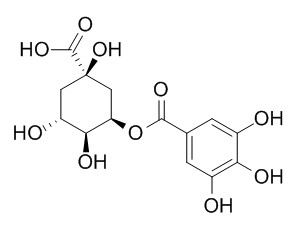5-Galloylquinic acid
5-Galloylquinic acid as an index for the baking intensity of oolong teas. It has antioxidant activity.
Inquire / Order:
manager@chemfaces.com
Technical Inquiries:
service@chemfaces.com
Tel:
+86-27-84237783
Fax:
+86-27-84254680
Address:
1 Building, No. 83, CheCheng Rd., Wuhan Economic and Technological Development Zone, Wuhan, Hubei 430056, PRC
Providing storage is as stated on the product vial and the vial is kept tightly sealed, the product can be stored for up to
24 months(2-8C).
Wherever possible, you should prepare and use solutions on the same day. However, if you need to make up stock solutions in advance, we recommend that you store the solution as aliquots in tightly sealed vials at -20C. Generally, these will be useable for up to two weeks. Before use, and prior to opening the vial we recommend that you allow your product to equilibrate to room temperature for at least 1 hour.
Need more advice on solubility, usage and handling? Please email to: service@chemfaces.com
The packaging of the product may have turned upside down during transportation, resulting in the natural compounds adhering to the neck or cap of the vial. take the vial out of its packaging and gently shake to let the compounds fall to the bottom of the vial. for liquid products, centrifuge at 200-500 RPM to gather the liquid at the bottom of the vial. try to avoid loss or contamination during handling.
Molecules.2019, 24(1):E159
Sci Rep.2019, 9(1):4342
Kangwon National University2022, 37(1):29-37
PLoS One.2018, 13(4):e0195642
J.Acta Agriculturae Scandinavica2017, 571-575
Sci Rep.2018, 8(1)
Naunyn Schmiedebergs Arch Pharmacol.2017, 390(10):1073-1083
J Physiol Biochem.2024, 80(2):421-437.
Sci Rep.2019, 9(1):18080
Reprod Toxicol.2020, 96:1-10.
Related and Featured Products
Journal of Food and Drug Analysis, 2017,26(2):609-619.
Relative content of gallic acid over 5-galloylquinic acid as an index for the baking intensity of oolong teas.[Reference:
WebLink]
METHODS AND RESULTS:
Phenolic compounds in a series of old oolong teas prepared by baking annually were monitored and compared. The results showed that the relative content of gallic acid over 5-Galloylquinic acid was subsequently elevated during this preparatory process. To reveal the effect was mainly resulted from baking or aging, two sets of oolong teas were collected and examined; one set was generated from fresh oolong tea via continually daily baking and the other set was composed of aged oolong teas with no or light baking in the storage period. The relative content of gallic acid over 5-Galloylquinic acid was observed to be subsequently elevated when oolong tea was continually baked at 90, 100, 110, and 120 °C for 8 h day after day. In contrast, the relative contents of gallic acid over 5-Galloylquinic acid in aged oolong teas with no or light baking were found to be similar to or slightly higher than that in fresh oolong tea.
CONCLUSIONS:
The results suggest that the relative content of gallic acid over 5-Galloylquinic acid seems to be a suitable index for the baking intensity of oolong tea in different preparations.
Food Chemistry, 2017, 237.
An integrated antioxidant activity fingerprint for commercial teas based on their capacities to scavenge reactive oxygen species.[Reference:
WebLink]
An integrated antioxidant activity fingerprint, based on on-line screening methods for three reactive oxygen species (ROS: superoxide anion radical, hydrogen peroxide, and hydroxyl radical) was developed to comprehensively evaluate the quality of 12 batches of commercial tea.
METHODS AND RESULTS:
High-performance liquid chromatography (HPLC) coupled with a chemiluminescent detector was used to determine the antioxidant characteristics of a selection of teas as bioactivity fingerprints. An HPLC–electrospray ionization–mass spectrometry analysis was used to determine the chemical profiles of the teas in the chromatographic fingerprints. All of the green teas (S01–S08) were better scavengers of the three ROS compared to the oolong teas (S09–S12). The main scavengers of the three ROS in green tea were 5-Galloylquinic acid, (−)-epigallocatechin-3-O-gallate, and (−)-epicatechin-3-O-gallate, whereas in oolong tea, they were (−)-epigallocatechin-3-O-gallate and (−)-epigallocatechin.
CONCLUSIONS:
This study demonstrates that comprehensive fingerprinting is a potentially meaningful method for evaluating the quality of food products.



